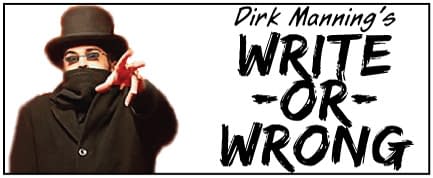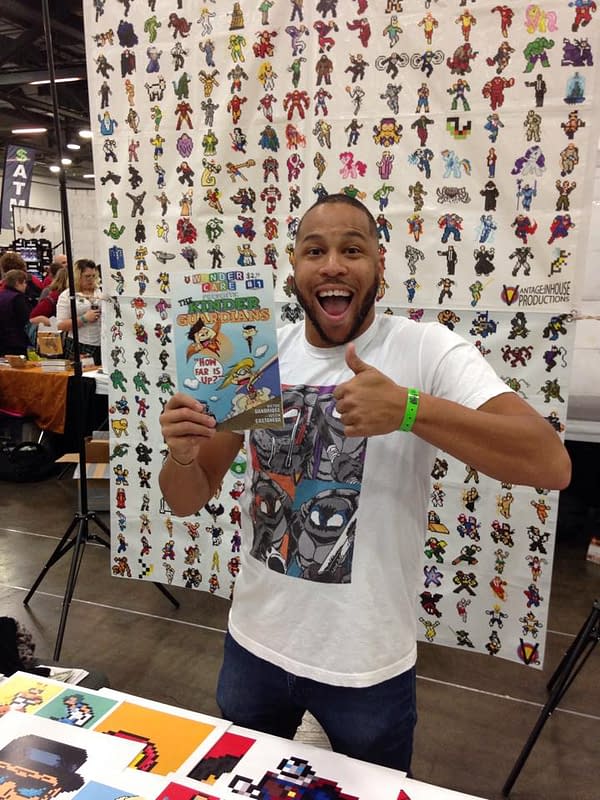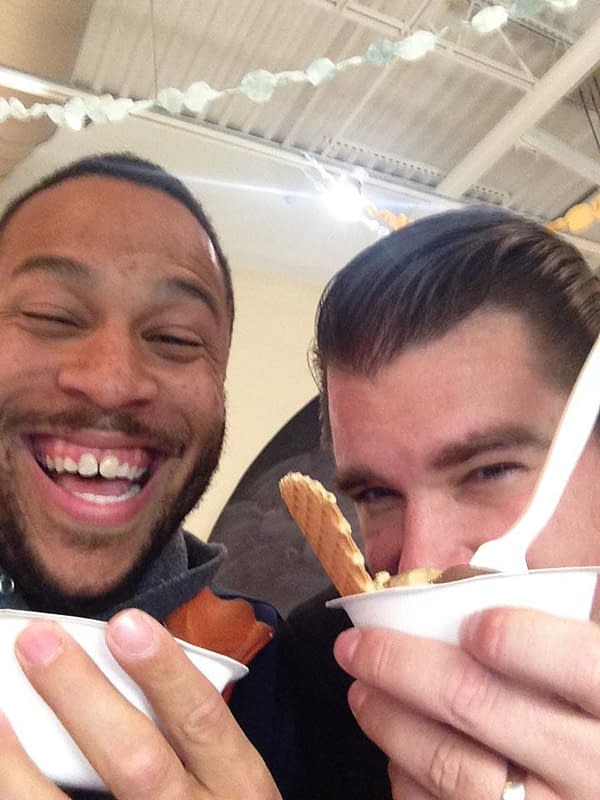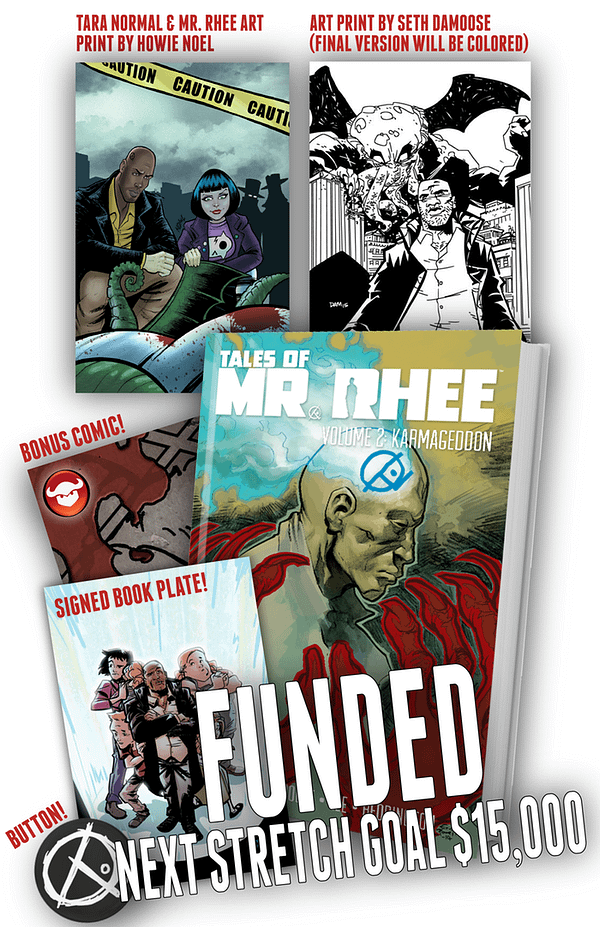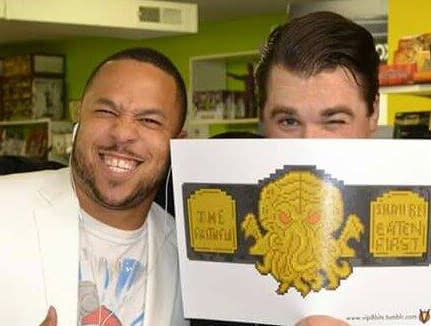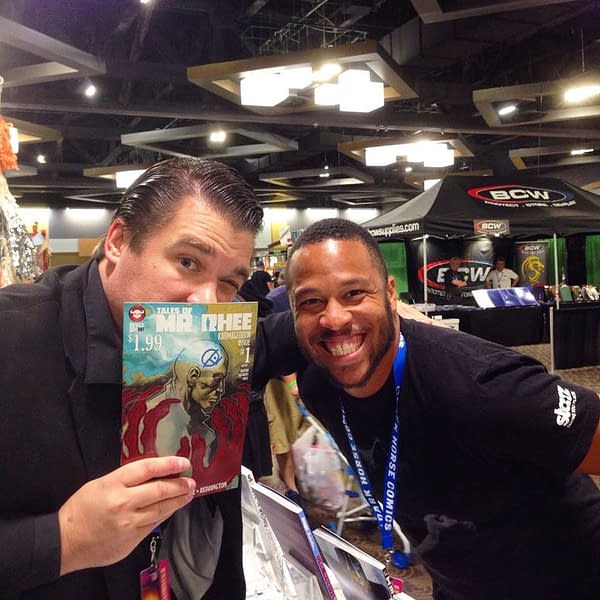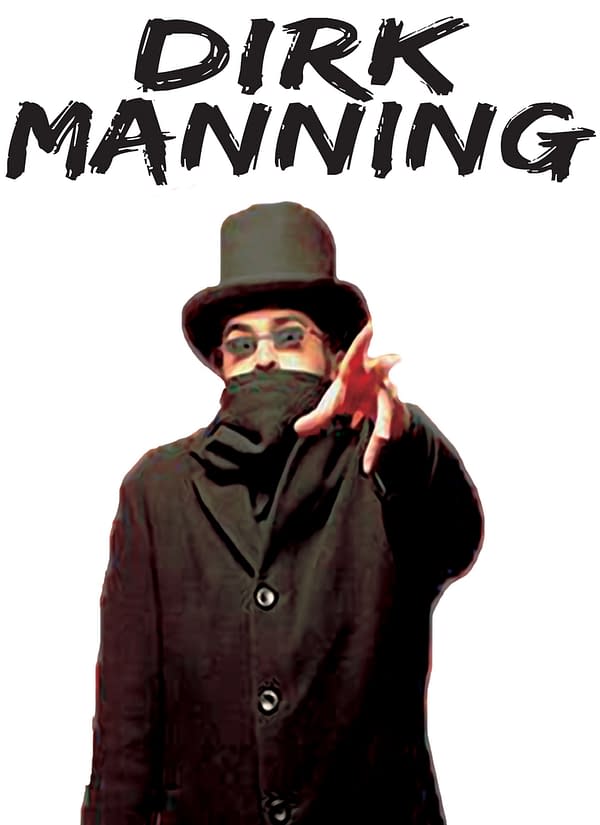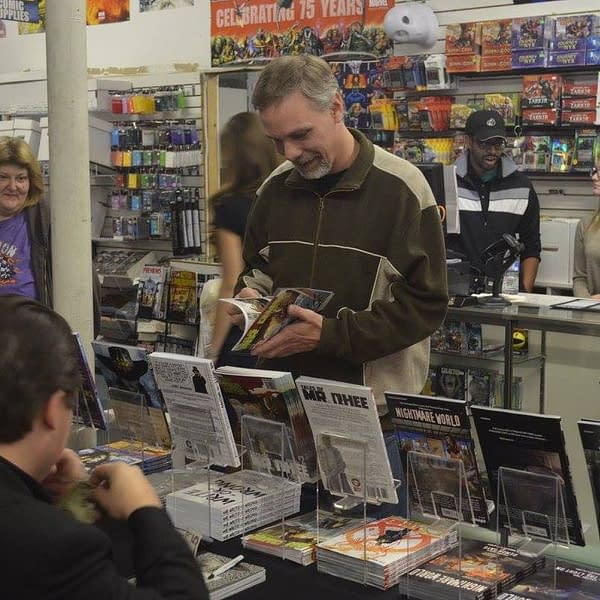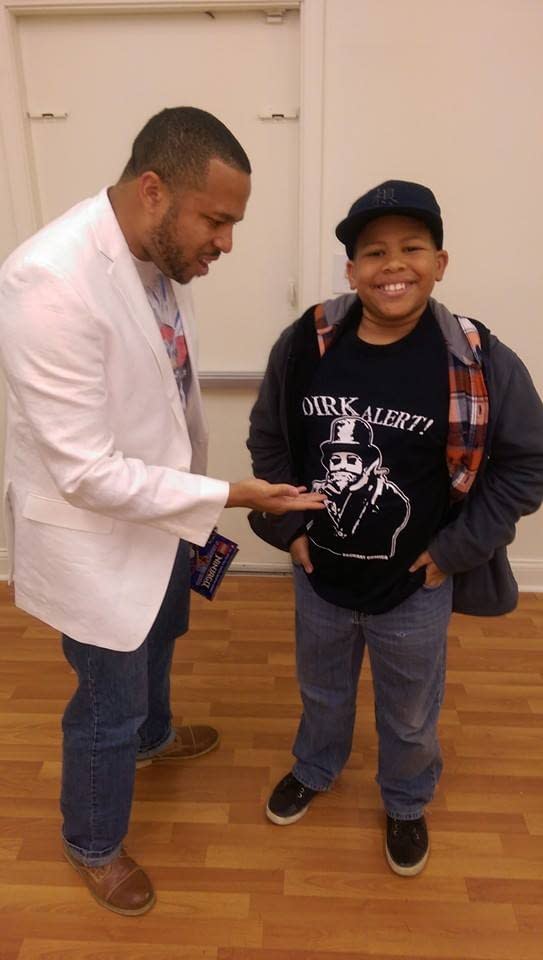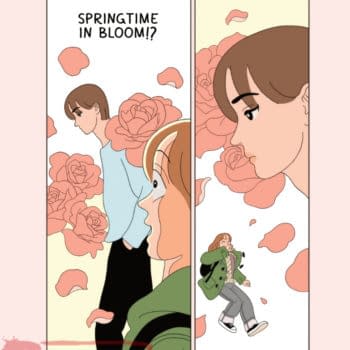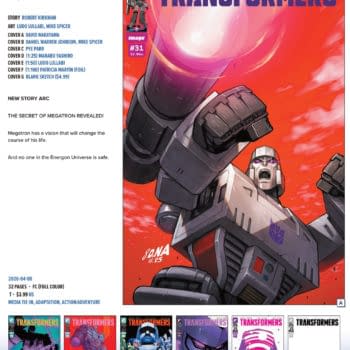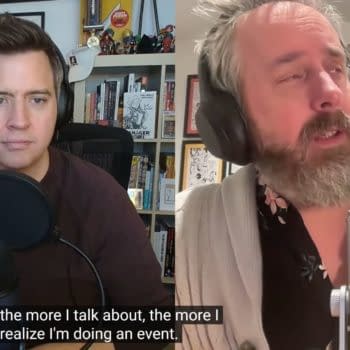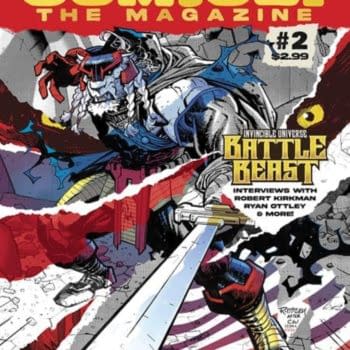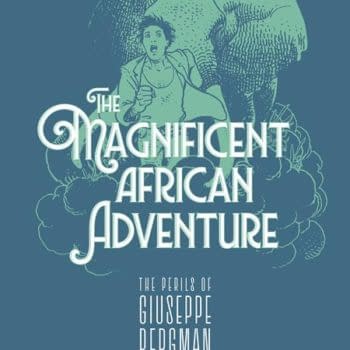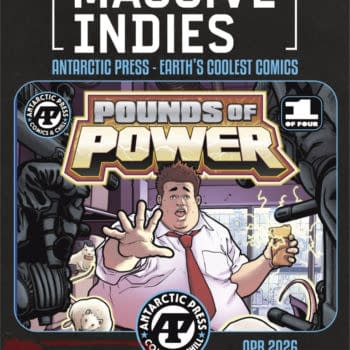Posted in: Comics, Recent Updates | Tagged:
Road Warriors, Wizard Worlds, And Life on the Road – Write Or Wrong #84 by Dirk Manning
(with special thanks to Victor Dandridge Jr.)
Dirk Manning writes for Bleeding Cool when he's not writing comics or touring to promote those comics. Victor Dandridge Jr. prompted this particular column.
I really like Victor Dandridge Jr., both personally and professionally – and yes, when it comes to your peers in the comic industry, there can be – and oftentimes is – a difference.
In the case of Victor, though, he's a guy who I originally got to know first as a fan, then as a fellow creator, finally, as a friend.
As I became more and more familiar with Victor's comic work and work ethic, I also came to realize that he's among the most talented and dedicated up-and-coming comic book writers most comic fans haven't heard of… yet.
Victor – whose work is all published under his own Vantage: Innhouse Productions imprint/label – has been quite the road warrior in the last few years, promoting his comics (including The Samaritan, The Kinder Guardians, and The Trouble With Love), hosting "U CR8 Comics" seminars/workshops geared towards helping young kids learn about how to make comics, and selling his "8-Bit Art" prints – quite literally – from coast to coast.
Victor had a bit of a problem, though, that he graciously said I could share with all of you for the sake of this column.
As time passed, Victor's "8-Bit Art" had become quite the draw (and profit engine) for him, but his notoriety as "The 8-Bit Guy" came with an unexpected consequence.
You see, the novelty of his "8-Bit Art" was overshadowing his comic work.
Being friends, Victor confided in me about his dilemma: The "8-Bit Art" was making him a lot of money, but he had to decide whether he wanted the money… or to realign his focus – and his brand and image – on his work not as a "The 8-Bit Guy," but as "Victor Dandridge Jr.: Comic Book Writer."
Lest I ever be accused of burying the lead, let me say right now that there's a powerful lesson there, folks: "How do you want to be recognized by others both inside and outside the comic industry?"
Victor and I got together and talked a bit about the crossroads he found himself standing at, and with him ultimately making the decision to end promoting his "8-Bit Art" as the 2015 Convention Circuit began – which also served as a natural breaking point, as it coincided with him joining the Wizard World comic convention circuit as a permanent guest at all their shows in 2015.
Victor's jump from "The 8-Bit Art Guy" to an indie comic creator/self-publisher aligned with Wizard World's comic convention circuit was a move that raised a lot of eyebrows among some of his peers. Many of them (and, again, I divulge this all with Victor's blessing) felt Victor was somehow damaging his "indie cred" by becoming so tightly affiliated with the comic/pop culture juggernaut that is so routinely cast as the villain of up-and-coming creators and smaller comic conventions alike all across the country.
During a recent trip through Columbus, Ohio (Victor's stomping ground – and am absolute hotbed of great comic talent) Victor and I met-up again for a social visit with no further intentions than to catch-up and hang-out for a bit while I happened to be passing through town.
As we continued to kibitz over ice cream, though, our talk turned more and more to business matters – including the trials and tribulations of "life on the road," his new alliance with the Wizard World conventions, and what it's like for mid-tier (and rising) creators like ourselves to do so many conventions every year, and the financial realities of selling books and comic art at conventions one sale at a time.
When Victor joked that our "ice cream social" was turning into a live Write or Wrong column, we made the decision to begin recording our conversation in order to share some insight – and perhaps even a little wisdom – on what it's like to be "Road Warriors" on the convention circuit…
Here, for your reading (and hopefully learning) pleasure, is the whole unabridged conversation…
GIVING THE DEVIL HIS DUE
Victor Dandridge Jr.: Now that we're taping this, let me say on record that you, Dirk, are my friend and my mentor.
Dirk Manning: Thanks, dude! You know I think the world of you, too. Allow me to reply by saying, on record, that you hustle harder than anyone I know… and I mean that as a most sincere compliment.
VDJ: It's nice to hear you say that… but all of that being said, now that we're rolling I need to bust your chops for a moment. [laughs]
DM: Dang it! I should have known you were setting me up for something! [laughs]
VDJ: For me my convention circuit for 2015 started in January, while for you pretty-much took the first month of the year off. Why is that? I thought you'd get right back on the road after the holidays given your whirlwind touring in 2014…
Dirk Manning: Well, as I'm sure we'll talk about in a bit, I chose to stay off the road for most of January in order to focus on setting-up the Tales of Mr. Rhee: "Karmageddon" Kickstarter campaign with Devil's Due. We had a successful funding campaign when we ran a Kickstarter for Tales of Mr. Rhee Volume 1: "Procreation (of the Wicked)" last year, but even so, I found there was were a lot of things I would wanted to do differently during my second time around, so I decided to dedicate January to working with Devil's Due Entertainment founder Josh Blaylock to make sure this second campaign was exactly what I wanted it to be.
VDJ: How was it working with Devil's Due on this? I'm assuming it's a pretty positive relationship if you're back for Round 2…
DM: Oh yeah. I think anytime you start to work with a publisher – especially on a creator-owned project – there are some things that need to get smoothed out as you and your editor and/or publisher get to know how each other operate, but as we prepped for this second Kickstarter campaign, Josh and I had a lot of talks about how to approach it, and honestly, I give him a lot of credit for really letting me set-up this campaign exactly as the way I wanted to run it, while still being there to give or offer advice when I needed or wanted it.
Now, that being said, let me be very upfront about the fact that Devil's Due – and Josh himself – have been around the block, experiencing some major successes and also taken some pretty big lumps as well… but the result of all of those experiences is a wealth of knowledge at his disposal. He's one of those types of people who, like I describe at the very beginning of the Write or Wrong book, "knows the road." While I think everyone should ultimately make their own decisions, only a fool doesn't very seriously consider the advice of people with experience – especially when they've had experiences that are good and bad.
Now, that being said, Josh and I both have a very specific – and I'd argue different – set of skills that complement each other very well – especially for the purposes of stuff like this Kickstarter campaign.
I often use the loving analogy that he's a little bit more punk rock and I'm a little bit more metal: we have our fundamental differences, but our trees draw water from the same river, so to speak. [laughs]
Anyway, the end result of us really putting our heads together on this campaign – and then him trusting me with the finer details of the way I wanted to lay out the Pledge Levels and such after we talked – was us launching the Tales of Mr. Rhee: "Karmageddon" Kickstarter on Monday, February 2nd… and us hitting our funding goal of $6,666 dollars in under eight hours.
We then went on to hit $13,000 in pledges in 13 days, and the campaign has just been rocking as we blew past our first four Stretch Goals in two weeks and had to set-up four more after that which we're now moving through! I knew in my heart that this was a good campaign for a great book, but I never, in my wildest dreams, thought that we'd be this successful this quickly.
The success we're having, though, is a testament both the strength of the book itself as well as Josh and I bringing the best of our experiences, beliefs, and resources to the table in order to create a great campaign about a great book that has a lot of people really excited about it.
VDJ: To give the devil his due, so to speak, you also did a lot of touring on the convention circuit towards the end of last year, too, in order to build-up some hype for your work and this campaign.
DM: Again, I think the success of this campaign is due in large part to how, with Tales of
Mr. Rhee: "Karmageddon," we're offering a readers a book that's different from pretty much everything else out there… but, that being said, I have little doubt that doing 24 conventions and signing appearances in the 18 weeks leading-up to the launch of this Kickstarter had a pretty sizable role in such a successful launch, too. [laughs]
VDJ: 24 shows is a grueling amount of to do in a whole year, let alone in 18 weeks!
DM: Well, when you consider that Tales of Mr. Rhee: "Procreation (of the Wicked)" had already been released and people had been responding to it really well, and then combine that with the fact that we were in the throes of releasing Tales of Mr. Rhee:
"Karmageddon" as a mini-series during that particular book signing tour, I saw a lot of advantages in being able to say to people "Hey… if you pick-up this first Tales of Mr. Rhee book and like it, you can get a Deluxe Limited Edition Hardcover of Volume 2 on Kickstarter in a few weeks."
WIZARD WORLD: FRIEND OR FOE?
DM: Speaking of being on the road, though, you're now officially a guest at every Wizard World show in 2015! What's up with that? How did you make that happen?
VDJ: The cheeky answer would be me saying "through a lot of hard work," but the reality is I put in quite a bit of face-time with them over the last 2 years, not only in terms of attending their conventions, but also being accessible for panels and things like that. I made myself an asset — essentially asking the key question of "What can I do for you?" as opposed to the other way around.
DM: I think there's a valuable lesson in what you just said there. You wanted to work with them more – and maybe get some perks – so you were willing to put in to get back. Well-played.
So, for the record, you're not an employee of Wizard World, then? Rather, this is sort of a win-win situation where you help them with their shows and they help give you a venue to promote your books?
VDJ: EXACTLY! I'm still as small-press as ever, but by pairing up with Wizard World for all their shows in 2015, I'm building strength and recognition, not only of my name, but my brand as well. A win-win is exactly what I'd call it!
DM: Since we're taping this for the intent of publishing it as a column, let's really address the elephant in the room here, which is the animosity so many creators seem to have towards the Wizard World conventions.
Full-disclosure, I do up to a few Wizard World shows every year, and I always find them both enjoyable and profitable. I especially like doing them because, when there, I oftentimes get a chance to meet and connect with people who don't attend other, non-Wizard shows.
That being said, there's a vocal percentage of creators out there – especially, again, what I'd call "mid-card" guys like you and I – who just rail against the Wizard World conventions every time they come-up. What's your take on that, and have you seen any blow-back from your peers for deciding to work so closely with them?
VDJ: I'd like to think that I've made myself more of a stand-out figure than one who could be so easily marred, but maybe not. I don't really know. There are people who irrationally – and I'm being frank when I say that – throw shade at Wizard. It's silly, really. 9 times out of 10, I'm sure Wizard's most vocal opponents have never even attended a Wizard World show or use one bad performance as some sort of justification. The truth is this: performance, sales, and profit at a show is you responsibility as the exhibitor, and I don't want to hear any whining to the contrary.
DM: I agree. I mean, sure, there are those shows where no one shows up – or the small people who do show-up are there just to look around without ever taking their hands out of their pockets – but I've very rarely experienced that type of show from Wizard World. They definitely attract a different crowd that, say, C2E2 in Chicago or Motor City Comic Con outside of Detroit, for example… but there's rarely a lack of crowds at the shows who do have a little pocket money left after they get their pop-culture star autographs and such.
That being said, point blank, brother, let's dig a little deeper here.
You're a creator who hasn't worked on any established corporate-owned properties, whose work isn't available in local comic shops through Diamond/PREVIEWS, and who – even like many of us who have such perks – really needs to "hand-sell" your work to get people to see it, let alone buy it and read it… and there's a lot of talk among some of our peers about how Wizard World shows, and I quote "aren't comic shows."
All of that being said, do you see Wizard World as a viable option for aspiring/up-and-coming creators who want to spread the word about their comic books?
VDJ: That depends, quite honestly, on the exhibiting creator. I'm not saying that Wizard World shows aren't, by comparison to many smaller and regional shows, expensive… because they do cost more to set-up at than some smaller shows. However, if a creator is interested and able – and being able is the key part – to play at that level, then by all means, throw your hat in the ring.. Say what you will of Wizard World, they have a very straight-forward "pay-to-play" model that doesn't curate their exhibitors the way other shows might. If you can pay the fee, you get your chance to make something happen, no matter your inexperience or lack of clout in the industry.
DM: That's a really interesting point that I think gets lost a lot in the conversation.
I know what I'm about to say is going to rub a lot of people the wrong way, but shows like San Diego Comic Con, C2E2, New York Comic Con are conventions creators need to earn the right to attend.
People can grouse all they want about "How the heck did _________ get in and not me?", but, hey, at the end of the day there's shows you have to apply to get into and there's shows that only require you to pay for a table before they're sold-out.
Even then, though – and I think this is where some people might get their noses a little out of joint – the fact of the matter is that there are some shows where you have to earn your spot there, and even then, you have to earn the opportunity to make money at the show… especially if it's a more expensive show, be it Wizard, ReedPOP, or whomever/whatever.
And, hey, if you can't afford to attend – or make a profit at – some of those more expensive shows, maybe you should quit complaining about it and instead go pay your dues at as many of the smaller comic conventions that are popping-up more and more all over the nation as you can.
Sure, those smaller one or two day shows may not be as "glamourous" as the bigger ones – and maybe you won't get your work in front of as many people, but I think a lot of creators – especially "indie" and "up-and-coming" guys – fail to realize that it's more beneficial to make a dozen meaningful impressions/connections at a convention rather than 100 fleeting ones.
FLYING SOLO AT IN-STORE SIGNINGS
VDJ: Your run of 24 signing appearances in 18 weeks was a mix between comic conventions and store signings, and I give you a lot of credit for putting yourself out there for store signings like that, because when you do that you'll find out really quickly if your work draws people in or not. For any enterprising creators out there, how do you go about setting up the in-store events?
DM: Whenever I'm going to a convention I try to make it a point to stop into the local comic shops to poke around a bit, pick something up, and introduce myself to the store owners/managers if possible. You'll notice I said I buy something, too. Never expect something for nothing, folks.
If that's not an option, I instead make it a point to talk to the local vendors set-up at the convention I'm attending – usually before the show floor opens to the public. If I feel the "vibe" is right – that they're receptive to the fact that I'm a comic book writer whose work they can get in their stories through PREVIEWS – I broach the idea of swapping contact information and setting-up a signing at their store at some future date.
Some store owners love to do signings with creators, some not so much… but one thing's always the same no matter where you go: If you don't ask, the answer's always "No." [laughs]
VDJ: You've had work published by Image, Big Dog Ink, Zenescope, and now Devil's Due. Are there shops out there that aren't already aware of you and your work?
DM: Oh, sure… and that's to be expected here and there. A lot of comic shop owners do their best to keep abreast of all the books and creators that grace their shelves every week, but it's a daunting task for even the most passionate store owners and managers, you know?
Couple that with the fact that I've yet to ever write for Marvel or DC, and, sure, there's absolutely some store owners out there who don't know who I am.
That being said, the truth of the matter is that because I haven't written any corporately-owned superhero books yet, there's a percentage of people haven't read any of my comic work, and they may never read it until that happens.
Most people have heard of me, at least, when I introduce myself to them.
VDJ: Well, you also have a very easily-identifiable… what would you call it? Publicity photo? Brand logo? Both?
DM: Honestly, I think it's more of a brand logo than a publicity photo, as I don't go around dressing like that. I did it once at the behest of a publisher for, like, an hour, and I hated it. It took all the focus off the books, and I vowed never to do it again unless it was for a Halloween gag or something.
It's funny, as there are people who roll their eyes at be using that image of the guy in the top hat and scarf to brand myself, but, as you said, it does the trick. That image is an instantly recognizable one that that people associate with me, Dirk Manning, rather than any one book I've written.
So, you couple that "brand recognition" of the pic of the guy in the hat and scarf – even if it's a little tongue-in-cheek — with the fact that I did the Write or Wrong column over at Newsarama during their heyday before bringing it over here to Bleeding Cool, and then, as you said, combine THAT with the fact that I've had a pretty fair amount of both creator-owned and work-for-hire work published by several larger publishers, and, lo and behold, people will see me at a show – they see my banner or look at the Dirk Manning button on my suit jacket lapel – and say "Oh… you're Dirk Manning! I know you from __________…" and so our conversations begin.
IS LIFE ON THE ROAD WORTH IT?
VDJ: Here's that horrible point where we try to quantify our convention experiences into "shareable" tidbits. Was your "24 shows in 18 Weeks" tour successful?
DM: Only me and my accountant know for sure! [laughs]
No, no… in all seriousness, though, it's funny that you ask me this, as I just filed my comic book earnings in 2014 for tax purposes. I did a total of 37 signing appearances in 2014, and about half of them were in-store signing appearances while the other half were conventions.
I'm not going to get into the exact numbers here, but when you break down the money I made divided by the number of shows I did… I'm pretty happy about my profit margin per appearance when you average everything out.
There have been shows where I made a few thousand dollars over a three day weekend, and there was one particular in-store signing appearance where I only made $20 in four hours, which didn't even cover my gas money to get there – but that comes back to paying your dues… and taking notes for the future, you know? [laughs]
VDJ: Oh yeah — not every pan yields gold! But that goes back to what you always say about this being a marathon and not a sprint. If you're in it for the long-haul, you gotta suffer the famines as well as the feasts!
DM: The other thing to consider when considering "Is it worth it?" regarding setting-up at all these conventions are the long-term benefits that extend beyond the immediate financial rewards.
Appearing at signings and conventions is also about brand-building, which is something you and I talked a lot about in regards to you switching your focus from your "8-Bit Art" prints to the comics you've written and then collaborated with some really great artists on to create. I don't know this for sure, but I'd be willing to bet that the profit margin on the "8-Bit Art" was probably a lot higher than it is on your comic books… but it's all a matter of how you want to be seen and recognized, you know?
Do you want to be seen as a guy who makes fan art… or as a comic book writer and creator?
VDJ: Fan-art does have quite the alluring mark-up, but you're 666% correct! [laughs]
I was being known as "The 8-Bit Guy", which was a great nod to being popular and making money, but started doing this to make comics. No… let me say that more directly: I MAKE COMICS, and it's a point that almost no one recognized because so much focus was on the "8-Bit Art."
It was nice taking in some comfortable figures, but I was losing some of my soul with every choice to chase a dollar over getting my stories into peoples' hands.
DM:: Making money on comics isn't easy, even in bulk, and even when you're directly hand-selling them at shows like you and I do so much.
Plus, in regards to selling your work at conventions, the fact of the matter is that most of the people who are attending a convention have about 75% of their spending-cash – their "pocket money" – pre-spent before they even set foot on the show floor.
As a result, even if you have a publisher for your creator-owned work, you're probably going to have to really get out there and market and promote yourself and your own work.
That's I have no problem putting on my work boots and busting my ass by promoting myself all over social media and in comic shops and across the convention circuit to build my brand awareness for myself and my books that way.
VDJ: You're talking about earning it.
DM: Working for it, earning it… however you look at it and however you have to do it, the key is to conduct yourself professionally at conventions and in-store signings to get the word out there about yourself and your work.
Bottom line, I know my creator-owned series like Tales of Mr. Rhee have audiences out there that will go crazy for them – and then hopefully that will turn them on to the other books and series I write such as Nightmare World, too.
I believe in myself, the books, and the art teams that work on me with them to get out there and connect with that audience one Facebook post, Tweet, Instagram upload, and – perhaps most importantly – convention or signing appearance at a time.
VDJ: Coming full circle, do you want to make this a two-parter and talk about Tales of Mr. Rhee a bit? Because I've got some questions for you about the series and how well your campaign has been going, and I'm sure a lot of other people would like to hear about what you've learned about running a successful campaign, too! [laughter]
DM:: Sure… but let's grab another round of ice cream, first. This round's on me! [laughs]
***
TOMORROW: Two Write or Wrong columns in two days? Yes… RHEE-ly! C'mon back tomorrow wherein Victor and Dirk talk about the uber-successful launch of the Tales of Mr. Rhee: "Karamgeddon" campaign (now in its last week), lessons that can be learned from the experience, and the future of the franchise after both through crowd-funding and the direct market!
***
Dirk Manning is the writer/creator of Tales of Mr. Rhee (Devil's Due Entertainment), the Nightmare World trilogy of graphic novels and Love Stories (To Die For) (Image Comics/Shadowline), and Write or Wrong: A Writer's Guide to Creating Comics (Caliber Comics – and available in print and digital format from Amazon.com). Details on all his work, upcoming appearance, and more can be found at www.DirkManning.com. Dirk lives on the Internet and can usually be found lurking around Twitter and Facebook on a fairly regular basis… when he's not busy writing or touring, of course. Feel free to follow him at one or all such locations if you're into that sort of thing. Cthulhu is his homeboy.


